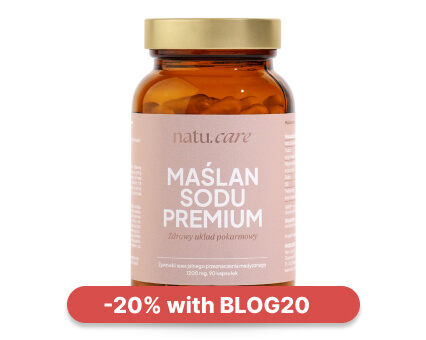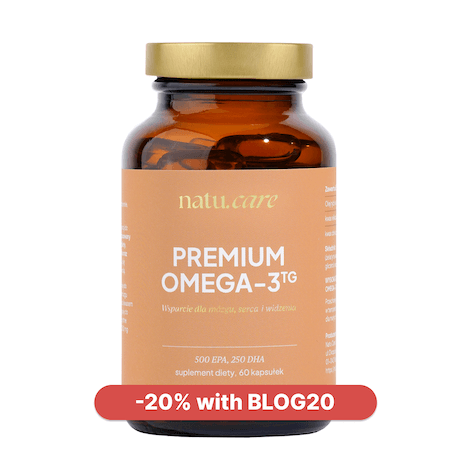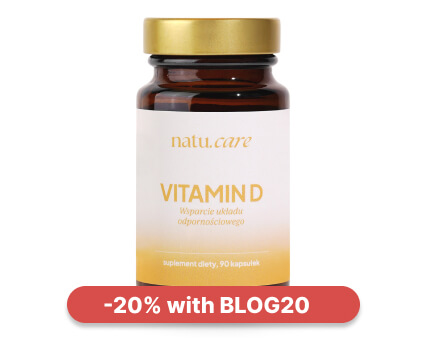Chromium - properties, uses, supplementation, sources. Does it help you lose weight?
Chromium is a micro-element about which researchers debate whether it is really necessary for us!


Learn more about our editorial process
.

Learn more about our editorial process
.

Learn more about our editorial process
.

Learn more about our editorial process
.
Why you can trust us
Articles on Natu.Care are written based on scientific research, data from government websites and other reliable sources. The texts are written in cooperation with doctors, nutritionists and other health and beauty experts. Articles are reviewed before publication and during significant updates.
.Learn more about our editorial process
.Information about advertisements
Content on Natu.Care may contain links to products from the sale of which we may receive a commission. When creating content, we adhere to high editorial standards and take care to be objective about the products discussed. The presence of affiliate links is not dictated by our partners, and we select the products we review ourselves completely independently.
.Learn more about our terms and Conditions
.Chromium is a micro-element that our bodies do not need much of. Interestingly, in some medical circles researchers are questioning whether this mineral is actually necessary for us!
Discussions among scientists about chromium are ongoing, but we know for sure that this element has several important functions in our body. From this article, you will learn, among other things, what the properties of chromium are, why it is difficult to identify products rich in this element and why you won't lose weight from chromium supplements.
The following are some of the most important facts about chromium.
Description of contents:
.- Chromium - role in the body .
- Chromium for weight loss - does it work .
- Chromium - sources in the diet .
- Chromium deficiency - symptoms .
- Chromium excess - symptoms .
- Recommended doses of chromium .
- Chromium dietary supplements - product overview .
- Summary .

Sprawdź, za co pokochały go tysiące klientek Natu.Care Premium Omega-3ᵀᴳ -15% z kodem BLOG15
Natu.Care Omega-3ᵀᴳ Premium
Natu.Care Omega-3ᵀᴳ Premium dla zdrowia serca, mózgu i odporności. Najlepsza przyswajalność. Optymalna dawka 750 mg. Przebadana przez niezależne laboratorium.
Zobacz więcej
Produkt ma super skład, transparentną etykietę i co dla mnie jest ważne – małe kapsułki do połknięcia. Nie ma też nieprzyjemnego efektu odbijania rybą, który miałam spożywając inne produkty. Widzę znaczną poprawę odporności. Polecam!@Kasia P.
See also:
Chromium - role in the body
.
Chromium is a micro-element that occurs in your body in trace amountsand. We only have 0.4-6 mg of chromium in the body . The intestinal bioavailability of this element is only 2.5% .
Good chromium, bad chromium
.
There are two basic forms of chromiumand:
.
- Trivalent - chromium (III) . A biologically active dietary ingredient that can be found in foods. It is not deposited in the body and is excreted mainly in the urine. .
- Secondary - chromium (VI)and. Considered a toxic substance and dangerous to humans. It is only used in industry and is not intended for food use.
Inhalation of chromium (VI) compounds irritates the respiratory tract and can cause pulmonary sensitisation . Increases the risk of lung, nasal and sinus cancer.
In this article, we will focus on chromium (III).
Properties of chromium
.
It was not until the 1960s thatand scientists identified chromium as the next major player among minerals in the human body. Although some researchers are currently questioningand whether this mineral is actually necessary for us, it has certain functions in the body.
How does chromium affect our body?
.
- .
- Participates in the metabolism of fats, proteins and carbohydratesand.
- Promotes digestive enzyme activity and gene expression .
- Improves immune and antioxidant capabilities .
- May regulate blood cholesterol levels .
- May increase tissue sensitivity to insulin in type II diabetes .
- May lower blood sugar in type II diabetes .
- May reduce the urge to snack and reduce feelings of hunger .
Chromium for weight loss - does it work?
.
No, the use of chromium supplements does not lose weightand. If you come across a promise of a weight-loss effect of chromium somewhere - check what research the author is citing.
Based on current evidenceand, chromium is not effective in significant weight loss in overweight or obese individuals. It appears to be even less effective in people of normal weight, even when combined with exercise.
There are, however, studies that suggest that supplementation with 600 to 1,000 μg of chromium picolinate per day may help reduce feelings of hungerand, reduce snacking and binge eating in some peopleand. Remember, to lose weight, a diet and calorie deficit is key.
Natu.Care Collagen Premium 5000 mg, mango & passion fruit

- Collagen content: 5000 mg marine collagen hydrolysate
- Additional active ingredients: vitamin C, low molecular weight hyaluronic acid (and L-theanine and coenzyme Q10 in cocoa flavoured collagen or vitamin A and vitamin E in mango–passion fruit flavoured collagen)
- Form: powder sachets
- Dose: 1 sachet per day
- Sufficient for: 30 days
Product description
Fish collagen from the Natu.Care brand in a dose of 5000 mg, based on certified ingredients of the best quality. Regular supplementation will positively influence the appearance of the skinóry, hairów and nails – they will be rebuilt and strengthened from the inside.
In addition to collagen, which is valuable for health and beauty, it also offers other active ingredients that help to maintain a youthful complexion, shiny hair and strong nails.
The formula contains a sufficient portion of the active ingredient to positively affect joints, the musculoskeletal system and immunity.
Natu.Care Premium Collagen is available in two flavours – Cacao Bloom and Rise&Shine. Both formulas are based on the following active ingredients: marine collagen hydrolysate, wild roseóbud extract and hyaluronic acid.
Additionally, Cacao Bloom contains natural L-theanine, coenzyme Q10 and defatted Dutch cacao. Rise&Shine instead contains vitamin E and vitamin A.
These are the best collagens in the world.
These best fish collagens on the market also rós taste – Cacao Bloom is a treat for chocolate lovers. Rise&Shine will appeal to those whoólike the refreshing taste of mangoófruit and passion fruit.
Pros and cons
Pros:
- Vitamin C supports the body's collagen production, enhancing its effectiveness.
- An effective dose of hyaluronic acid, which additionally supports skin hydration and joint health.
- Fish collagen absorbs 50% better. Additionally, the manufacturer specifies the fish species it is sourced from (Atlantic cod).
- The composition has been tested by the independent and accredited J.S. Hamilton laboratory.
- MSC (Marine Stewardship Council) quality certification, which confirms that the collagen source supports sustainable fishing practices.
Cons:
- None.
Additional information
Natu.Care's fish collagen receives praise for its delicious taste. You won't find the fishy aftertaste that often comes through in other collagens. Plus, you have two tasty flavors to choose from: cocoa and mango-passionfruit.
Active ingredients like coenzyme Q10, hyaluronic acid, and natural L-theanine provide anti-inflammatory and antioxidant benefits while slowing down aging processes.
User review
Super, after about 6 weeks of use, the skin on my face became noticeably firmer. Wonderful taste.
Ania ZalewskaNatu.Care customer
Natu.Care Premium collagen 10 000 mg, mango-maracuja
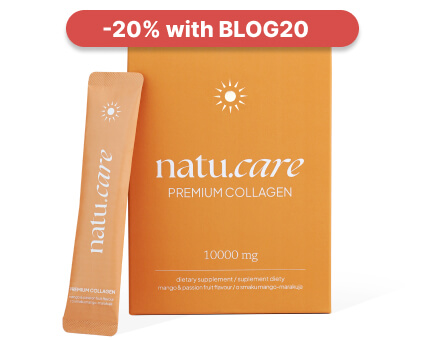
- Collagen content: 10,000 mg marine collagen hydrolysate
- Additional active ingredients: vitamin C, low molecular weight hyaluronic acid (and L-theanine and coenzyme Q10 in cocoa flavoured collagen or vitamin A and vitamin E in mango–passion fruit flavoured collagen)
- Form: powder sachets
- Dose: 1 sachet per day
- Sufficient for: 30 days
Product description
One of the strongest collagens on the market, whichós provides as much as 10,000 mg in a daily serving. This allows the formula to effectively support the condition of the skin, hair and nails.
With this supplement, you will support your beauty, which will allow you to visually stop the ageing process and feel a second youth!
Natu.Care Collagen Premium 10 000 mg comes in two flavours – cherry and mango-maracuja. Both formulas have the same product backbone – collagen, hyaluronic acid and vitamin C.
In the cherry version you additionally find glucosamine, chondroitin and Indian frankincense resin extract. Mango-maracuja, on the other hand, contains vitamin E and vitamin A.
Pros and cons
Pros:
- Tested collagen formula – SeaGarden, whose effects have been confirmed in clinical studies.
- Effective dose of hyaluronic acid, additionally moisturizing the skin and positively impacting joint health.
- Vitamin C supports the body’s natural collagen production.
- The composition has been tested by the independent and accredited J.S. Hamilton laboratory.
- The product has an MSC (Marine Stewardship Council) quality certification – the collagen source supports sustainable fishing practices.
Cons:
- None.
Additional information
Users praise Natu.Care Collagen Premium for the easy dissolvability of the powder.
User review
I noticed a significant improvement in my skin texture after a few weeks of taking collagen regularly. My complexion is now as soft as velvet!
Natu.Care Collagen Premium 10000 mg, cherry

- Collagen content: 10,000 mg of hydrolyzed bovine collagen
- Additional active ingredients: vitamin C, low molecular weight hyaluronic acid, glucosamine, chondroitin, extract of Indian frankincense resin (boswellia serrata)
- Form: powder sachets for drinking
- Serving: 1 sachet per day
- Lasts for: 30 days
Product description
One of the strongest collagens on the market, providing as much as 10,000 mg per daily serving. This product can effectively support the condition of joints, skin, hair, and nails.
With this supplement, you will support your skeletal and joint system as well as your beauty, helping you visually halt the aging process and feel rejuvenated!
Pros and cons
Pros:
- The daily portion of collagen is very large – as much as 10,000 mg.
- Proven collagen formula – COLLinstant, whose effectiveness has been confirmed in clinical studies.
- Effective dose of hyaluronic acid, which additionally moisturizes the skin and positively affects joint health.
- Vitamin C supports the body's natural collagen production.
- Glucosamine is a fundamental building block of compounds found in joint cartilage and a component of collagen that gives elasticity to connective tissue in tendons.
- Chondroitin is a natural component found in the human body, mainly in cartilage. This large molecule (mucopolysaccharide) has the ability to absorb water, which helps maintain the elasticity and resilience of cartilage.
- Frankincense resin extract supports blood circulation and joint mobility and reduces their stiffness. It may help alleviate inflammatory conditions.
- The composition has been tested by the independent and accredited J.S. Hamilton laboratory.
Cons:
- None.
Additional information
Users praise Natu.Care Collagen Premium for the easy dissolving of the powder.
Premium Sodium Butyrate
Product description
Premium Sodium Butyrate is a natural support for your digestive system. With a high dose of butyric acid (940 mg), it supports the regeneration of the intestinal mucosa, improving gut health and function, and aids in the absorption of nutrients. By taking care of your intestines, you're taking care of the health of your entire body.
Studies involving people suffering from irritable bowel syndrome confirm that sodium butyrate is ideal for supporting issues related to bacterial flora imbalances (for example, after antibiotic therapy), constipation and diarrhea, inflammation of the intestinal mucosa, or a diet low in fiber.
Premium Sodium Butyrate capsules are made using the innovative DRcaps® technology. This guarantees that the active ingredients in the product are protected from the destructive effects of stomach acids and digestive enzymes. As a result, we can be sure that the beneficial ingredients are released in the small intestine and are fully absorbed by our body.
Premium Sodium Butyrate from Natu Care is 100% tested, and its composition contains only the highest quality raw materials.
Pros and cons
Pros:
- Supports digestive system function
- Helpful for various gastrointestinal conditions, including IBS
- High dose of butyric acid in each capsule
- Eco-friendly, clean, and tested composition
- Free from added sugar, gluten, GMOs, and lactose
- Innovative capsule technology - DRcaps
Cons:
- None
Additional Information
Take 3 capsules daily at any time of the day, preferably with a meal. Swallow the capsules whole with water.
Premium Sodium Butyrate is intended for adults.
The product should be used under medical supervision.
User review
I've been using the product for 2 weeks. My stomach feels lighter, and my digestion has improved. I recommend it.
Natu.Care Premium Magnesium + Vitamin B6
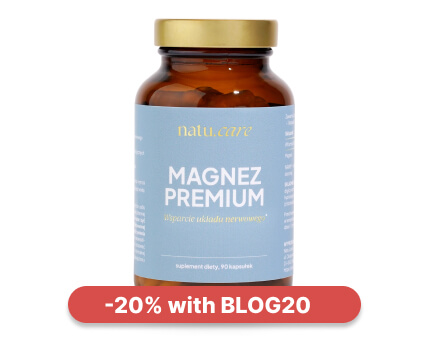
- Magnesium content per day: 305 mg
- Additional active ingredients: Vitamin B6 (2.1 mg)
- Form: capsules
- Serving size: 3 capsules per day
- Sufficient for: 30 days
Product description
The Premium Magnesium + Vitamin B6 dietary supplement is a comprehensive product that combines three organic forms of magnesium (citrate, malate, and diglycinate) and vitamin B6 in highly absorbable forms.
Magnesium is an essential mineral without which our bodies cannot function properly. It supports the immune, nervous, and muscular systems, maintains electrolyte balance, and is involved in cell division and the regulation of mental functions.
Research shows that magnesium supplementation is even more effective when accompanied by vitamin B6, which is included in our product. Vitamin B6 is responsible for the proper functioning of the nervous and immune systems, as well as the proper functioning of the heart.
If you want to safely get rid of feelings of fatigue, concentration problems, hair loss, muscle cramps, trembling, or irritability, reach for Premium Magnesium from Natu.Care, tested by the independent, certified laboratory J.S. Hamilton Poland.
Pros and cons
Pros
- Supports the proper functioning of the nervous and immune systems.
- Reduces feelings of fatigue and tiredness.
- Maintains proper psychological functions.
- The purity of the ingredients (free from anti-caking agents, artificial fillers, and additives such as titanium dioxide, microcrystalline cellulose, talc, magnesium stearate, and silicon dioxide) has been confirmed by laboratory tests.
- High absorption of ingredients.
- Soft capsules that are easy to swallow.
- Suitable for vegetarians and vegans.
Cons
- None.
Additional information
Take with a meal, 3 capsules per day.
The capsules should be taken with at least 250 ml of water.
If you have trouble sleeping, it is advisable to take 1 capsule in the morning and 2 capsules in the evening, no later than 4 hours before bedtime.
Avoid combining with products high in calcium (milk, yogurt, cheese), as this may negatively affect magnesium absorption.
Pregnant and breastfeeding women should consult a doctor before starting supplementation.
User review
I’m very impressed with the speed of delivery. The product itself is of high quality and absorbs well. After two weeks of supplementation, I’ve noticed a significant improvement in muscle recovery, especially during periods of intense training. I highly recommend it!
Product description
The dietary supplement contains omega-3ᵀᴳ, or omega-3 acids in the form of trójglyceridesów. Scientific studies suggest that this form of fatty acidsós up to 2 times better absorbed than the estersós present in many dietary supplements on the market. This means that you are assured of their effectiveness and of supplying yourself with valuable omega acids.
Fatty acids omega-3 are derived from wild anchovy oil. It is a rich source of healthy fats that are essential for the health of the cardiovascular, immune and nervous systems, as well as the proper function of vision, joints muscles.
Scientific research suggests that wild anchovies are a good source of healthy fats.
Scientific research also suggests that an adequate intake of omega-3 fatty acidsós protects against and supports the treatment of depression and anxiety disorders. In addition, omega-3s influence the hydration and appearance of the skinóry and support healthy sleep.
.
The formula contains a total of 750 mg of EPA+DHA acidsós, which is three times higher than the recommended minimum of 250 mg for the Polish population. Omega-3 TG Premium has studies indicating that its TOTOX is 9, which is a very good result.
Supplementation of omega-3 fatty acidsóis recommended for anyone who does not eat 1–2 portions (approximately 300 g) of oily fish per week. Children during growth, seniors, physically active people, vegans and vegetarians, as well as patients undergoing cardiovascular treatment and prevention of heart disease also have an increased need.
Pros and cons
The dietary supplement contains omega-3ᵀᴳ, or omega-3 acids in the form of trójglyceridesów. Scientific studies suggest that this form of fatty acidsós up to 2 times better absorbed than the estersós present in many dietary supplements on the market. This means that you are assured of their effectiveness and of supplying yourself with valuable omega acids.
Fatty acids omega-3 are derived from wild anchovy oil. It is a rich source of healthy fats that are essential for the health of the cardiovascular, immune and nervous systems, as well as the proper function of vision, joints muscles.
Scientific research suggests that wild anchovies are a good source of healthy fats.
Scientific research also suggests that an adequate intake of omega-3 fatty acidsós protects against and supports the treatment of depression and anxiety disorders. In addition, omega-3s influence the hydration and appearance of the skinóry and support healthy sleep.
.
The formula contains a total of 750 mg of EPA+DHA acidsós, which is three times higher than the recommended minimum of 250 mg for the Polish population. Omega-3 TG Premium has studies indicating that its TOTOX is 9, which is a very good result.
Supplementation of omega-3 fatty acidsóis recommended for anyone who does not eat 1–2 portions (approximately 300 g) of oily fish per week. Children during growth, seniors, physically active people, vegans and vegetarians, as well as patients undergoing cardiovascular treatment and prevention of heart disease also have an increased need.
Additional information
The dietary supplement contains omega-3ᵀᴳ, or omega-3 acids in the form of trójglyceridesów. Scientific studies suggest that this form of fatty acidsós up to 2 times better absorbed than the estersós present in many dietary supplements on the market. This means that you are assured of their effectiveness and of supplying yourself with valuable omega acids.
Fatty acids omega-3 are derived from wild anchovy oil. It is a rich source of healthy fats that are essential for the health of the cardiovascular, immune and nervous systems, as well as the proper function of vision, joints muscles.
Scientific research suggests that wild anchovies are a good source of healthy fats.
Scientific research also suggests that an adequate intake of omega-3 fatty acidsós protects against and supports the treatment of depression and anxiety disorders. In addition, omega-3s influence the hydration and appearance of the skinóry and support healthy sleep.
.
The formula contains a total of 750 mg of EPA+DHA acidsós, which is three times higher than the recommended minimum of 250 mg for the Polish population. Omega-3 TG Premium has studies indicating that its TOTOX is 9, which is a very good result.
Supplementation of omega-3 fatty acidsóis recommended for anyone who does not eat 1–2 portions (approximately 300 g) of oily fish per week. Children during growth, seniors, physically active people, vegans and vegetarians, as well as patients undergoing cardiovascular treatment and prevention of heart disease also have an increased need.
Expert opinion
The dietary supplement contains omega-3ᵀᴳ, or omega-3 acids in the form of trójglyceridesów. Scientific studies suggest that this form of fatty acidsós up to 2 times better absorbed than the estersós present in many dietary supplements on the market. This means that you are assured of their effectiveness and of supplying yourself with valuable omega acids.
Fatty acids omega-3 are derived from wild anchovy oil. It is a rich source of healthy fats that are essential for the health of the cardiovascular, immune and nervous systems, as well as the proper function of vision, joints muscles.
Scientific research suggests that wild anchovies are a good source of healthy fats.
Scientific research also suggests that an adequate intake of omega-3 fatty acidsós protects against and supports the treatment of depression and anxiety disorders. In addition, omega-3s influence the hydration and appearance of the skinóry and support healthy sleep.
.
The formula contains a total of 750 mg of EPA+DHA acidsós, which is three times higher than the recommended minimum of 250 mg for the Polish population. Omega-3 TG Premium has studies indicating that its TOTOX is 9, which is a very good result.
Supplementation of omega-3 fatty acidsóis recommended for anyone who does not eat 1–2 portions (approximately 300 g) of oily fish per week. Children during growth, seniors, physically active people, vegans and vegetarians, as well as patients undergoing cardiovascular treatment and prevention of heart disease also have an increased need.
Natu.Care Vitamin D 2000 UI
Product description
Vitamin D plays a crucial role in our health and well-being. It affects calcium and phosphate metabolism, which translates to healthy bones and teeth. It also helps regulate the immune system, and studies indicate its influence on the functioning of the nervous system.
Vitamin D, although called a “vitamin,” is actually a prohormone that our body produces on its own, primarily under the influence of sunlight. Unfortunately, our modern lifestyle contributes to deficiencies of this essential vitamin. Working in enclosed office buildings, using (necessary!) SPF creams, and covering the body with clothing all make it very difficult, if not impossible, to obtain adequate levels of vitamin D from sunlight. This is why appropriate, year-round supplementation is so crucial.
Vitamin D from Natu.Care is a well-tested vitamin D3 suspended in safflower oil, a plant known for its numerous health benefits. The convenient, easy-to-swallow capsule will make supplementation a part of your daily, healthy routine, improving your overall well-being.
Pros and cons
Pros:
- Ensures proper functioning of the immune system
- Supports the maintenance of healthy bones and teeth
- Maintains proper heart, kidney, and muscle function
- Tested by an independent, certified laboratory
- Convenient and easy-to-swallow capsule
- Clean composition - free from added sugar, gluten, GMOs, lactose, and without preservatives or colorants
Cons:
- None.
Additional Information
Pregnant women and breastfeeding mothers should consult a doctor before using the product. This dietary supplement is intended for a healthy adult population up to the age of 75.
Collagen Booster - Glow Stories
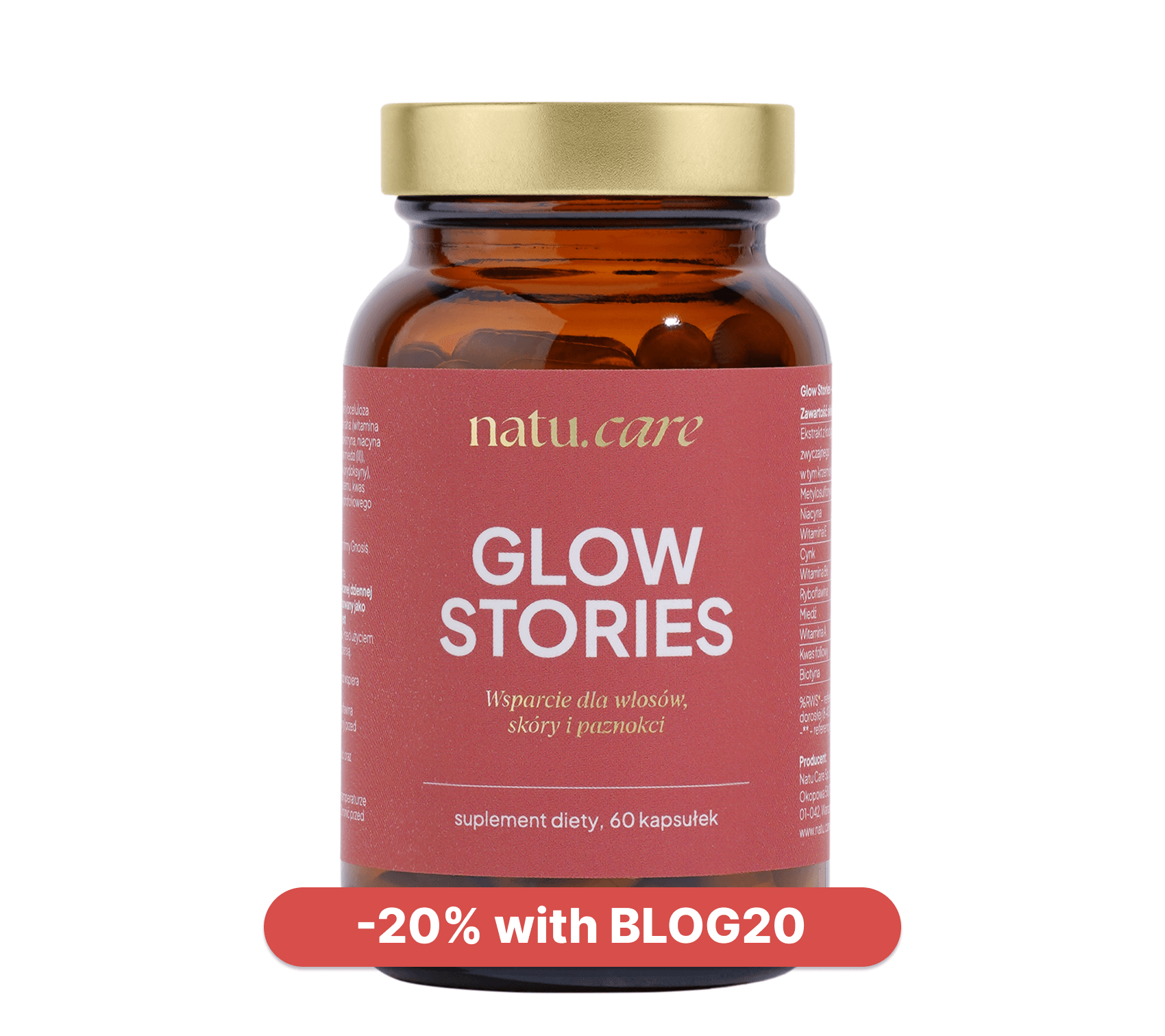
- Active ingredients: bamboo shoot extract, Quatrefolic®, L-Methionine, L-cysteine, vitamin E, vitamin A, niacin (vitamin B3), vitamin B6, vitamin B2 (riboflavin), biotin, zinc, copper
- .
- Form: capsules
- .
- Dose: 1 capsule per day
- .
- Sufficient for: 60 days
- .
Product description
A dietary supplement containing vitamins, minerals and plant extracts thatósupport the skinóhand, hair and nails. The product is especially distinguished by the form of folate – it is Quatrefolic, whichós absorbed very well and is natural.
In addition to valuable vitamins and minerals, such as vitamin A, E, B3, B2 and biotin, the formula contains bamboo shoot extract, whichóry further enhances your beauty.
Pros and cons
A dietary supplement containing vitamins, minerals and plant extracts thatósupport the skinóhand, hair and nails. The product is especially distinguished by the form of folate – it is Quatrefolic, whichós absorbed very well and is natural.
In addition to valuable vitamins and minerals, such as vitamin A, E, B3, B2 and biotin, the formula contains bamboo shoot extract, whichóry further enhances your beauty.
Additional information
A dietary supplement containing vitamins, minerals and plant extracts thatósupport the skinóhand, hair and nails. The product is especially distinguished by the form of folate – it is Quatrefolic, whichós absorbed very well and is natural.
In addition to valuable vitamins and minerals, such as vitamin A, E, B3, B2 and biotin, the formula contains bamboo shoot extract, whichóry further enhances your beauty.
Chromium - sources in the diet
.
This mineral is derived from the soil, so it is found in most vegetables, fruits, whole grain products, nuts, spices, beer yeast, beer and wine. However, the amount of chromium in these foods varies depending on local soil and water conditions, as well as production processesand.
 .
.
Aleksandra CudnaDietitian
.
The amount of chromium in oatmeal can vary by as much as 50 timesand (!) depending on differences in cultivation and processing. For this reason, let the list of chromium-containing products below serve you as a guideline rather than a rigid determinant.
Dietary sources of chromiumand:
- .
- full grain cereal products, .
- yeast, .
- oat flakes, .
- cacao, .
- grape juice, .
- legumes, .
- broccoli, .
- bananas, .
- apple, .
- eggs, .
- cholesterol cheeses,
- fruits, and eggs,.
- poultry meat, .
- beef liver, .
- tomatoes, .
Chromium deficiency - symptoms
.
No chromium deficiency is reported in healthy populationsand. Specific symptoms indicative of deficiency of this elementand have also not been established.
Probably the best studied group of people for chromium deficiency are patients fed parenterallyand. In these individuals, chromium deficiency manifested as impaired glucose tolerance, weight loss, peripheral neuropathy and confusionand.
There are some at-risk groups at risk of deficiency, but these individuals may just as well be deficient in other vitamins and minerals.
Who is at risk of deficiency chromiumand?
.
- Athletes -due to regular exercise and possible increased chromium excretion .
- Diabetics - possibly through altered chromium metabolism .
- Pregnant women - especially if the woman has diabetes or gestational diabetes .
- Older people - possibly due to increased urinary excretion of chromium .
Experts recommend that potential deficiencies in vitamins and minerals should first be supplemented through a balanced and varied dietand. A nutritious menu prevents most deficiencies. If you decide to take a dietary supplement, consult your doctor..
 .
.
Aleksandra CudnaDietitian
.
Chromium excess - symptoms
.
An excess of vitamins and minerals in the body most often occurs as a result of taking too many dietary supplementsand.
Experts at the European Food Safety Authority have concluded that there is a lack of conclusive scientific evidence to support the negative health effects associated with high chromium intake . However, this does not mean that we can take it by the handful. The dose makes the poison.
Excessive chromium supplementation can lead to stomach problems and low blood sugar (hypoglycaemia)and. Too much chromium in the body can also damage the liver, kidneys and nerves and cause irregular heart rhythms.
To avoid excess chromium in the body, be sure to take a reasonable and sensible dosage. Follow the manufacturer's instructions on the leaflet and remember that more does not mean better.
For the sake of avoiding excess chromium, follow the manufacturer's recommendations on the leaflet.
Recommended dosages of chromium
.
In nutrition standards for Poland the requirement for chromium has not been established. According to the recommendation of the National Centre for Nutrition Education the recommended average dose for an adult is 40 μg. The maximum daily amount of chromium in dietary supplements for adults is 200 µg in Poland. Chromium is a micronutrient, so we need it in small amounts compared to e.g. sodium, potassium, magnesium, which are macronutrients..
 .
.
Aleksandra CudnaDietitian
.
Chromium dietary supplements - product overview
.
When looking for the best chromium, pay attention to a few things:
.
- .
- Form of absorption. Buy organic chromium (e.g. chromium picolinate) as it is much better absorbed than inorganicand.
- Additional ingredients. Vitamin B3 and vitamin C support the absorption of chromium in the body.
- Dose per tablet. Some manufacturers counter-intuitively do not offer maximum allowable doses, but much smaller ones. This means that you need to take several servings per day, instead of one.
- Rationale. Cool down. Tempted by marketing slogans, think about whether you need this dietary supplement. Familiarise yourself with the proven and potential effects of chromium. .
- Check interactions with other dietary supplements, solid medicines and herbal preparations taken at the same time. You can read about this below.
- .
Chromium is often sold in supplement form together with berberine. Take a look at the article on berberine and find out if it helps with weight loss.
Chromium - interactions
.
Want to start supplementing with chromium? Take caution if you are takingand:
- levothyroxine (a drug used to treat thyroid disease), .
- insulin, .
- drugs used for the treatment of diabetes, .
- aspirin, .
- non-steroidal anti-inflammatory drugs, .
Are you using these substances and not sure whether or how to take chromium? Ask your doctor about safe supplementation.
Summary
.
The debate among researchers about chromium as an essential element for the body continues. As scientists exchange views and studies, chromium meanwhile deals with carbohydrate metabolism and digestive enzymes in your body. The biological process continues, regardless of the objections to the validity of taking this element.
See also:
- Thyroid tests [what to do + standards + results] .
- Blood tests [how often to perform + how to prepare]
- Cervical cancer [causes + symptoms + treatment] .
- The liver [symptoms + how to care for it and what to avoid] .
- Fatty (greasy) liver [what it is + causes + symptoms] .
- Saturation [norms + test + symptoms of low saturation] .
- Pulse oximeter [norms + results + which one to choose]
I just sat down to make oatmeal, it's even an exciting roulette! There's no telling where my oatmeal comes from or how much chromium it has! That's why it's so important to make sure our entire menu is varied and nutritious so we don't have to worry about that.
From this article, remember:
- Chromium is a trace element, and is found in small amounts in nature.
- There is only 0.4-6 mg of chromium in your body, and the bioavailability of this element in the intestines is only 2.5%.
- The best absorption of chromium is in the intestines.
- The best absorbed form is organic chromium - chromium picolinate. .
- Chromium has no weight-loss properties and supplementation alone does not cause weight loss.
- The amount of chromium in the intestines is not as high as in the intestines.
- The amount of chromium in food can vary considerably and depends on local soil and water conditions, as well as production processes.
- Chromium deficiency and excess are rare, and there are no official dosage recommendations. .
FAQ
.How does chromium work for weight loss?
.Chromium is not effective in weight loss in people who are overweight or obese according to current scientific evidence. It appears to be even less effective in people of normal weight. There are, however, studies There are, however, studies that suggest that supplementation with 600-1000 μg of chromium picolinate per day may help to reduce feelings of hunger, reducing snacking and overeating (so-called binge eating) in some people.
What time to take chromium?
.Chromium can be taken at any time of the day, but is best taken after a meal, which may increase its absorption into the body. Chromium's bioavailability is also favoured by the presence of vitamin C (e.g. in vegetables and fruit) and vitamin B3 (e.g. in wheat bran, chicken breast).
What not to combine chromium with
.Chromium should not be combined with magnesium, iron, calcium, zinc, vanadium, phytates, as these compounds negatively affect the absorption of each other and you will not supply them to your body at the same time. Safely maintain a 4 hour interval between chromium and these compounds.
Who should take chromium?
.Chromium may be helpful as an adjunct to the treatment of obesity, diabetes, abnormal lipidogram results. Chromium is safe for supplementation, but like any dietary ingredient it has contraindications for use, so consult your doctor before taking it.
Does chromium help diabetes?
.Scientific studies suggest that chromium may increase tissue sensitivity to insulin in diabetes and lower blood sugar levels in type II diabetes. Remember that chromium should only be taken as an aid and adjunct to the treatment of these conditions.
Which products are high in chromium?
.Most chromium is contained in whole grain cereals, yeast, oatmeal, cocoa,
.grape juice, legumes, broccoli, bananas, tomatoes, apples, eggs, yellow cheese. Poultry meat and beef liver are also good sources of chromium.
The following are good sources of chromium.
Does chromium reduce cravings for sweets?
.Yes, chromium can reduce cravings for sweets. Research suggests that supplementation with 600 to 1,000 μg of chromium picolinate per day may help to reduce feelings of hunger, reduce snacking and overeating (known as binge eating).
.
Sources
See all
.Anderson, R. A., Bryden, N. A., & Polansky, M. M. (1992). Dietary chromium intake. Biological Trace Element Research, 32(1), 117-121. https://doi.org/10.1007/BF02784595
.Brown, R. O., Forloines-Lynn, S., Cross, R. E., & Heizer, W. D. (1986). Chromium deficiency after long-term total parenteral nutrition. Digestive Diseases and Sciences, 31(6), 661-664. https://doi.org/10.1007/BF01318699
.Chan, Q., Wang, F., Han, Y., Ren, T., Shi, L., Ren, X., Zeng, F., Li, M., & Chen, W. (2022). An investigation on dietary chromium picolinate supplementation in the juvenile sea cucumber Apostichopus japonicus: Growth, digestive enzyme activity, growth-related gene expression, immune and antioxidant capacity. Aquaculture Reports, 24, 101099. https://doi.org/10.1016/j.aqrep.2022.101099
Di Bona, K. R., Love, S., Rhodes, N. R., McAdory, D., Sinha, S. H., Kern, N., Kent, J., Strickland, J., Wilson, A., Beaird, J., Ramage, J., Rasco, J. F., & Vincent, J. B. (2011). Chromium is not an essential trace element for mammals: Effects of a 'low-chromium' diet. JBIC Journal of Biological Inorganic Chemistry, 16(3), 381-390. https://doi.org/10.1007/s00775-010-0734-y
DiSilvestro, R. A., & Dy, E. (2007). Comparison of acute absorption of commercially available chromium supplements. Journal of Trace Elements in Medicine and Biology, 21(2), 120-124. https://doi.org/10.1016/j.jtemb.2007.01.004
.Dubois, F., & Belleville, F. (1991). [Chromium: Physiologic role and implications in human pathology]. Pathologie-Biologie, 39(8), 801-808.
.Jarosz, Prof. Dr. n med M. (2020, December 3). Nutrition Standards 2020. National Center for Nutrition Education. https://ncez.pzh.gov.pl/abc-zywienia/normy-zywienia-2020/
Jeejeebhoy, K., Chu, R., Marliss, E., Greenberg, G., & Bruce-Robertson, A. (1977). Chromium deficiency, glucose intolerance, and neuropathy reversed by chromium supplementation, in a patient receiving long-term total parenteral nutrition. The American Journal of Clinical Nutrition, 30(4), 531-538. https://doi.org/10.1093/ajcn/30.4.531
Offenbacher, E. G. (1992). Chromium in the elderly. Biological Trace Element Research, 32(1), 123-131. https://doi.org/10.1007/BF02784596
Office of Dietary Supplements-Chromium. (n.d.). Retrieved 17 March 2023, from https://ods.od.nih.gov/factsheets/Chromium-HealthProfessional/
Read "Dietary Reference Intakes for Vitamin A, Vitamin K, Arsenic, Boron, Chromium, Copper, Iodine, Iron, Manganese, Molybdenum, Nickel, Silicon, Vanadium, and Zinc" at NAP.edu. (b.d.). https://doi.org/10.17226/10026
Thor, M. Y., Harnack, L., King, D., Jasthi, B., & Pettit, J. (2011). Evaluation of the comprehensiveness and reliability of the chromium composition of foods in the literature. Journal of Food Composition and Analysis, 24(8), 1147-1152. https://doi.org/10.1016/j.jfca.2011.04.006
Vincent, J. B., & Lukaski, H. C. (2018). Chromium. Advances in Nutrition, 9(4), 505-506. https://doi.org/10.1093/advances/nmx021
.
Editorials
Meet the team


Editor
Graduate of Journalism and Artes Liberales at the University of Warsaw. Since 2017, he has been working with the biggest portals in Poland and abroad as an editor. Previously worked for 3 years in one of the leading pharmaceutical companies - he knows the health and beauty industry inside out. In his free time, he most enjoys playing tennis or skiing.

Fact-checker
Agata Jach is in charge of verifying quoted sources and checking that published content is truthful.

Fluoride is an essential mineral for the proper functioning of the body. How does it work and is it harmful? Check!
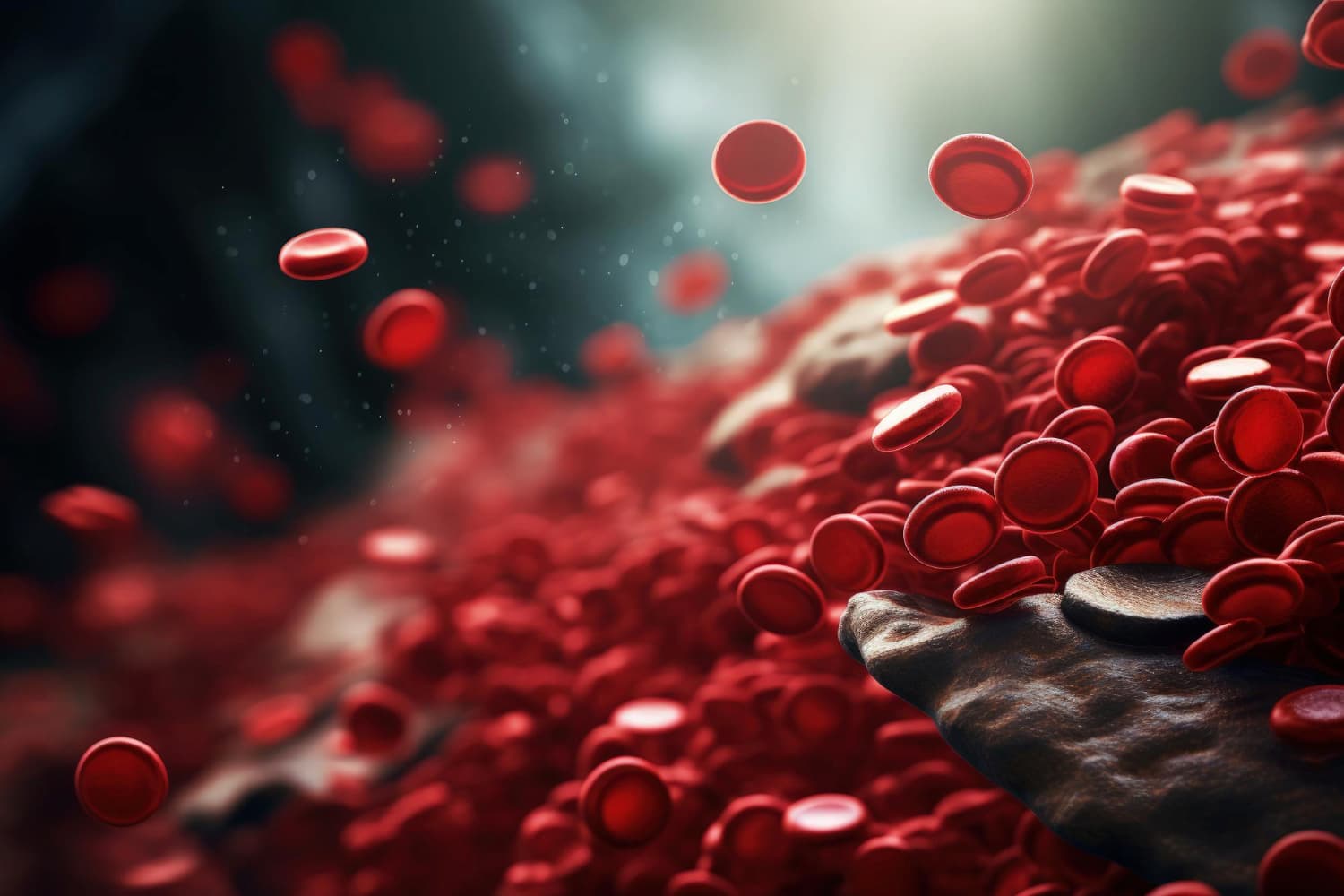
Iron deficiency is a dangerous condition leading to serious neurological and skin symptoms.

Phosphorus is a mineral element that supports bone health, nervous system function and also energy metabolism.
